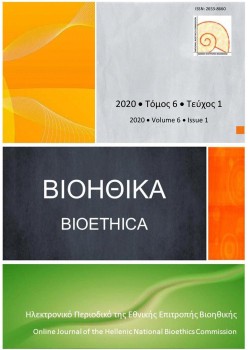The commercialization of the human body

Abstract
The medical community has to confront the shortage of organs available for human transplantation, resulting in large waiting lists worldwide. Hence, the introduction of a donor reimbursement system, which would partly serve as an incentive is often proposed. This model leads us, however, to the much-disputed notion of the commercialization of the human body.
This concept triggers a series of reactions of both moral and social interest. However, the philosophical justification of the actual legislative provisions is only used as a means to highlight the conflict between the various practices on the matter and is not itself the main focus of the present essay.
In addition to solid organs, other parts of the body such as the human reproductive material and the bone marrow are used for both therapeutic and research purposes.
Consequently, the following is an attempt to understand the concept of commercialization and whether it could act beneficially within certain contexts or contrariwise, cause great harm.
Article Details
- How to Cite
-
Merkou (Μαρία Μέρκου) M. (2020). The commercialization of the human body. Bioethica, 6(1), 17. https://doi.org/10.12681/bioeth.22620
- Section
- Original Articles

This work is licensed under a Creative Commons Attribution 4.0 International License.
Authors who publish with this journal agree to the following terms:
- Authors retain copyright and grant the journal right of first publication with the work simultaneously licensed under a Creative Commons Attribution CC BY 4.0 License, which allows for immediate free access to the work and permits any user to read, download, copy, distribute, print, search, or link to the full texts of articles, crawl them for indexing, pass them as data to software, or use them for any other lawful purpose. Appropriate credit must be given by citing the author(s) and the original publication in this journal.
- Authors are able to enter into separate, additional contractual arrangements for the non-exclusive distribution of the journal's published version of the work (e.g. post it to an institutional repository or publish it in a book), with an acknowledgement of its initial publication in this journal.
We encourage authors to deposit their articles, as well as data underlying the publications, in institutional and/or other appropriate subject repositories.
Bioethica permits and encourages authors to archive the final publication pdf in institutional (e.g. the repository of the National Hellenic Research Foundation) or other appropriate subject repositories (e.g. SSOAR repository for social sciences), in compliance with institutional and/or funder open access policies, after publication in the BIOETHICA. Authors must provide bibliographic details that credit publication in the journal, as well as related funding details (when applicable).
Lists of institutional and other subject-based academic open access repositories can be found listed by country at the registry http://opendoar.org/countrylist.php
If your institution does not possess a repository you may deposit a copy of your paper at no cost with www.zenodo.org , the repository supported for open access research in the EU by the European Commission, through the project OpenAIRE (www.openaire.eu )


